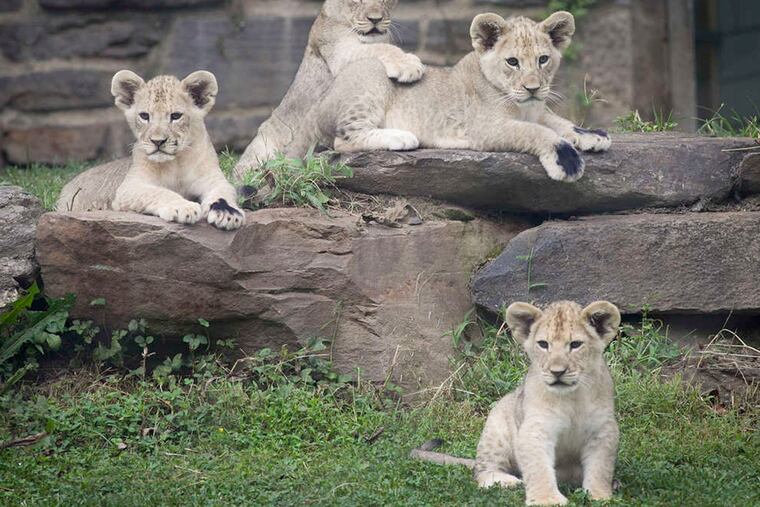
AFRICAN LION Tajiri, new mom to four fuzzy cubs who will charm zoogoers for the first time at the Philadelphia Zoo today, was into her babies' dad, Makini, from the second she laid her amber eyes on him.
But since lions mate for days on end, it wasn't the kind of decision that 5-year-old Makini - a shier, more pensive big cat than his flirtatious female counterpart - was willing to take lightly.
"Tajiri fell in love instantly and was rolling and chuffing and talking to him and trying super hard to say, 'I'm right here!' " Philadelphia Zoo curator of carnivores Tammy Schmidt said yesterday of the lions' courtship, which keepers said lasted about eight months before they finally mated in March. "He wasn't quite sure what to do with her. He sat like a very scared statue for a little while."
Yesterday morning, Tajiri crept from her indoor den into the balmy morning air in the lush, grassy exhibit yard at the zoo, and her cubs - called Mali, Kataba, Sabi and Msinga after places in their indigenous Africa - bobbed around her feet. As the babies got bolder, traipsing through the grass under their proud mama's watchful gaze, keepers, curators and others who were instrumental in bringing the lion couple together talked about the big cats' journey.
Big-cat zookeepers Jen Robertson and Kay Buffamonte said they were careful to introduce Tajiri and Makini slowly, first letting the lions take peeks at one another from yards separated by barriers. Later they allowed them to get closer through a special mesh door connecting their "bedrooms" inside.
Tajiri knew from the start it was meant to be. But Makini, reserved like a true older man, needed more convincing. They'd been paired by the Association of Zoos and Aquariums' Species Survival Plan - a sort of Match.com for animals - which put forth Tajiri as a good match for the zoo's Makini.
"I think he [Makini] lacks a little self-confidence so he was a little unsure what to do, but Tajiri would ease him along, and he obviously was a right mate for her," Robertson said. "Tajiri was the one that was initiating everything, and she was the one that was trying to convince him."
When Tajiri finally did hook her mate, it was on, Robertson said yesterday. "He brought his A-game," she said, grinning.
He had to, she said: The pair mated for three days straight, 20 to 50 times a day (less than lions usually mate in the wild, she added, which can be more than 100 times in a day) - in full view of all spectators at the First Niagara Big Cat Falls exhibit, no less.
"They did it right on the exhibit. . . . Try to explain that to the kids!" Robertson giggled. "The first time we noticed, they were right by the glass doing it."
On the mating days, she said, she found a creative way to talk around the cats' coupling during the daily 11 o'clock lion talk she and Buffamonte give.
"Then Taj is rolling around" between trysts, she said. "I just say, 'Hey, she's feeling pretty today.' "
Tajiri gave birth to her cubs, the first born at the zoo since 1996, overnight June 25 into June 26 in her private den, keepers said. Since their birth, the babies have stayed in mostly private quarters with the first-time mom, who zoo officials said has been a natural.
As they explored their exhibit yesterday, Taj playfully batted and nuzzled her cubs.
Once the family gets acclimated to the new digs, they will be reunited with Makini to form a pride. In the wild, experts said, it's common for the mother and cubs to stay separate from the father for the first few months.
Robertson said the cubs won't look like babies for long: Lions grow quickly, so within six months, the little ones, now estimated to be in the 20-pound range, will start to look mature. They'll still act like babies for about a year, she said, but the time to see them as true young lions is limited.
Besides the feat of getting Tajiri and Makini to mate, Robertson said the cubs are four miracles for the zoo because after Tajiri arrived in 2012, she fell ill from a fungal infection she had contracted at her former zoo in Wisconsin.
"She was very sick, and we were treating her and treating her. So it is a miracle that she's made it this far, not only that she overcame the fungal infection but she also was successfully introduced to Makini and successfully bred," the keeper said.
The pair will likely breed again at the zoo in the future, now that they're proven mates.
Dr. Andy Baker, chief operating officer of the zoo, said the cubs' birth, which coincides with the zoo's "Year of the Big Cat" campaign to educate people on conservation efforts related to the nine species of cats it has, is an opportunity for a whole new generation to see lion cubs.
"I hope that a lot of people will take the opportunity to see the cubs while they're still small," Baker said. "It's a great chance for people in this region to see lion cubs."
Blog: PhillyConfidential.com